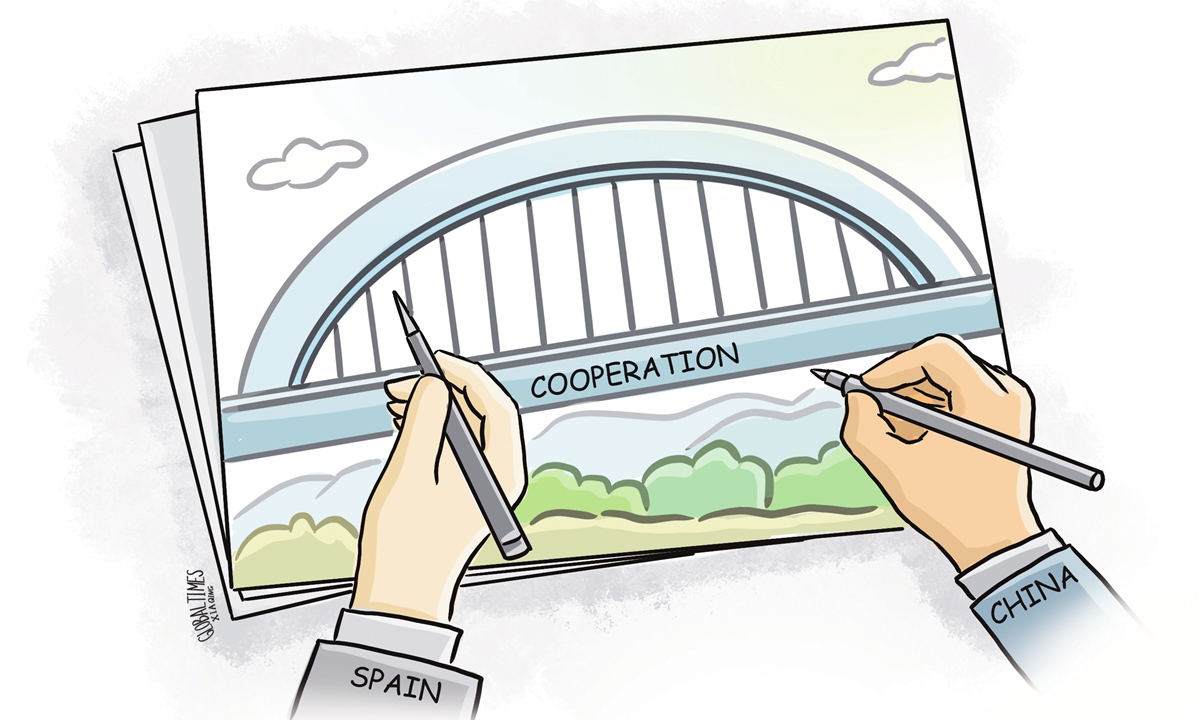中国和西班牙可以在转型中打造合作蓝图 - 2025-11-11

The state visit by Spanish King Felipe VI to the People's Republic of China from Monday to Thursday marks a significant milestone in the trajectory of China-Spain relations. This royal visit takes place in the context of the 20th anniversary of the comprehensive strategic partnership between the two countries and is seen as an opportunity to further enhance political mutual trust and inject new impetus into pragmatic cooperation.
In recent years, the Spanish government under Prime Minister Pedro Sánchez has made three visits to China, reflecting a resolute pivot toward pragmatic economic diplomacy. Particularly noteworthy was Spain's decision in 2024 to withdraw its support from European Union-imposed tariffs on Chinese electric vehicles.
On the economic and trade front, the data indicate a growing and diversifying dynamic, as well as strong resilience. For example, by 2024, the bilateral trade volume between China and Spain reached $50.1 billion, representing a 3.2 percent year-on-year increase. In the sectors of clean energy, electric mobility and digital transformation, Chinese firms such as CATL, Envision Energy and Huawei Technologies Co., Ltd. have entered the Spanish market through investments in battery plants, green hydrogen parks and digital innovation projects. The two economies have deepened cooperation in new energy, electric mobility and digital transformation - areas that embody the pursuit of green and high-quality development.
This context acquires an additional symbolic dimension when linked to the shared memory of World War II and the anti-fascist struggle, 80th anniversary of whose victory the world marked this year. That chapter of international cooperation - in which Chinese contingents supported the Spanish government and people in their fight against fascism in the name of justice and peace - opens a path of historical empathy that may reinforce the ethical foundations of bilateral ties. In this regard, the royal visit is not merely a diplomatic gesture, but a platform to renew the commitment of both peoples to build a "community with a shared future for humanity."
In a world buffeted by geopolitical tension, unilateralism and economic disruption, Spain and China can serve as examples of respectful and complementary cooperation. Madrid advocates for access for its industries to the Chinese market and supports the integration of global supply chains, while Beijing offers its vast market, emerging technologies and a policy of openness. If that roadmap is realized, the Spain-China bilateral relationship could serve as an axis of stability and development between Europe and Asia.
However, several challenges lie ahead. To begin with, maintaining momentum beyond symbolism will require concrete outcomes: expanded two-way investment, deeper high-technology cooperation and mutual market access.
Second, the notion of cultural and people-to-people exchanges must go beyond high-level visits. Language, media, academic and youth exchange programs need to be deepened so that the Spanish public better understands China's development path. This is crucial in overcoming distorted narratives and translation barriers, which Chinese analysts say continue to hamper Western media's accurate portrayal of China.
Third, the evolving global landscape - marked by supply chain adjustments, growing calls for "decoupling" from certain Western blocs and intensified competition in emerging technologies - poses both challenges and opportunities for the China-Spain partnership. Madrid is expected to pursue a balanced and pragmatic approach that aligns its commitments within the EU framework with its long-term economic interests in China's vast market and innovation ecosystem.
The symbolic timing of this visit - on the 20th anniversary of the Comprehensive Strategic Partnership and at a moment when China emphasizes major-country diplomacy and global responsibility - lends it added weight. For Spain, it offers a chance to move from diplomacy of presence to diplomacy of substance. For China, it is an occasion to build momentum in Europe beyond its traditional large-economy partners and to showcase its model of development and openness to foreign businesses.
In summary, the state visit by the Spanish king is more than a ceremonial event. It is a strategic moment for shaping the next chapter of bilateral relations - one in which Spain and China can jointly contribute to global governance, resilient supply chains, sustainable development and cultural understanding. If both sides seize the opportunity, they can set a blueprint for cross-regional cooperation in an era of transformation: a blueprint of mutual respect, shared interests and forward-looking partnership.
The author is Hector Gomez,a Spanish geopolitical analyst and translator based in China.
Source: Global Times
